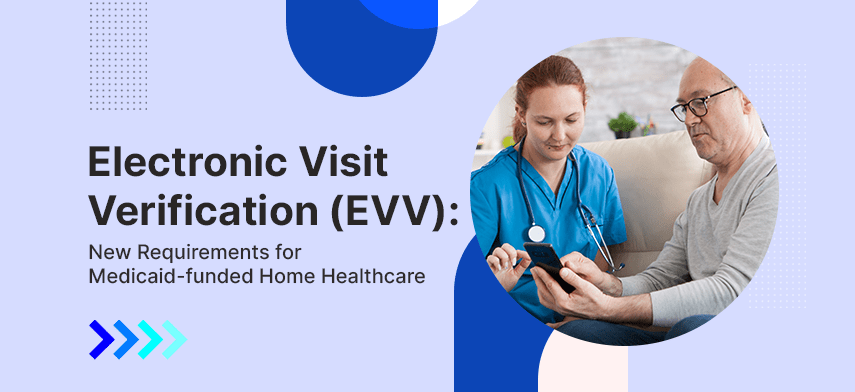Electronic Visit Verification (EVV): New Requirements for Medicaid-funded Home Healthcare
 Mobisoft Infotech
Mobisoft InfotechElectronic Visit Verification (EVV): New Requirements for Medicaid-funded Home Healthcare
A year past the first federally mandated deadline, many home health care, hospice, and community care providers are still struggling to meet the new electronic reporting requirements of the 21st Century Cures Act (enacted in 2016).

Known as Electronic Visit Verification (EVV), these federal reporting regulations require states to put a reporting system in place for electronically verifying every home health care visit that is paid for by Medicaid. Home health care providers are required to use their state’s EVV reporting system to document and report their Medicaid-funded home health care visits or choose their own EVV vendor that meets the state’s regulatory requirements.
Medicaid Home Health Care Visits to be Documented in Real-Time
Providers have to document their home health, hospice, and community care visits while in the field by reporting the required data in real-time using their state-approved EVV reporting system.
For each Medicaid-funded health care visit the provider must collect, at a minimum, the following data:
The date the health care visit was provided
The location where the health care visit was provided
The type of service(s) performed
Who received the service(s), i.e., the individual patient
Who delivered the service(s), i.e., the individual healthcare professional
The actual start and end times for the health care visit
These Medicaid reporting requirements were put in place to stop Medicaid fraud and waste. By requiring real-time reporting from the field and confirming key information electronically (for example, using GPS to confirm location and cell phone timestamps to confirm visit start and stop times). EVV reporting systems make it difficult to report incorrect or fraudulent data to the state’s Medicaid agency.
Reporting Responsibilities for Home Health Care Providers
Any healthcare provider who delivers home health, hospice, or community care that is paid for by Medicaid must collect this data and submit it to their state’s Medicaid agency using the state-approved EVV reporting system.
The federal regulations allow states to set their EVV requirements and choose the reporting systems that they use—as long as they meet all federal requirements. States also have the option of requiring more data to be reported than what’s mandated by the federal government. Because of this, EVV reporting requirements and systems can vary from state to state.
It is the healthcare provider’s responsibility to understand and meet the EVV reporting requirements for each state it delivers care in. For those providers who deliver home health care services in more than one state, this may mean using a different EVV solution reporting system or having to collect additional data, depending on the state where the care was provided.
States Determine the EVV Reporting System Used
Each state must implement an EVV reporting system by the federally mandated start date or face possible penalties.
States were mandated to have an EVV system up and running for all Medicaid Personal Care Service (PCS) by January 1, 2020. The mandated start date for Medicaid Home Health Services (HHCS) is January 1, 2023.
The penalty for missing these mandates is having the state’s Federal Medical Assistance Percentage (FMAP) reduced by up to 1%. States can apply for an exemption from this reduction if they have made a “good faith effort” to get an EVV reporting system up and running and have encountered “unavoidable delays.” Several states have applied for this exemption.
Federal regulations do not mandate that states adopt a specific EVV reporting system. Each state decides what system it will use to satisfy the federal reporting requirements.
A few states have chosen to implement a single, specific EVV reporting system that their home health care providers must use. This is referred to as a closed system approach. For example, Texas and Kansas have chosen this approach.
Most states, however, have chosen to use an open approach to their EVV reporting system. These states accept data from a variety of reporting systems, as long as that reporting system meets the state’s requirements. Missouri is a state that has adopted the open approach, allowing providers to choose the EVV system vendor that best meets their needs.
The Challenges of EVV Compliance for Providers
Home health, hospice, and community care providers face several challenges in complying with these Medicaid reporting requirements.
As with any regulation, providers need to understand the requirements and the best way to meet them. In deciding what is best, providers should consider how to integrate EVV reporting in their established home health care delivery process to minimize any disruptions to their current workflow.
Consider how the health care professionals will collect the required data while in the field. Will they use an app or tablet? Can the data captured be easily shared with the care scheduling and delivery and EHR systems that are in place? For providers who operate in more than one state, will you have to use separate apps for reporting to different states? Will the health care team need to be trained on more than one EVV reporting system?
Read More: https://mobisoftinfotech.com/resources/blog/electronic-visit-verification-for-home-healthcare
Subscribe to my newsletter
Read articles from Mobisoft Infotech directly inside your inbox. Subscribe to the newsletter, and don't miss out.
Written by

Mobisoft Infotech
Mobisoft Infotech
Mobisoft Infotech is a software product engineering company dedicated to providing value, quality, and lasting business expansion through digital innovation, change, and the adoption of technology. Our proficiency in digital technology encompasses Mobile, Cloud, DevOps, Web, IoT, AI, UI/UX, Testing, Robotic Process Automation, and various other digital transformation services, catering to companies across a wide range of industries. With more than ten years of experience in constructing digital solutions, offering consulting, and handling outsourcing, Mobisoft has assisted clients from over 30 countries in embracing digital transformation, capitalizing on market prospects, and attaining sustained outcomes.
